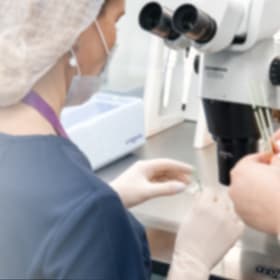FERTILITY PRESERVATION IN DELTA FERTILITY CLINIC

It’s been known for quite a while that it’s technically impossible to preserve egg cells inside a human body. The only reliable option is to gather and freeze them, but the question is, what method to use?
We have three options of fertility preservation in women: to freeze egg cells, embryos or ovarian tissue. To make the right decision, one should take into consideration not only treatment characteristics but also the effectiveness of the procedure for the upcoming pregnancy.
Let’s talk about treatment characteristics first.
For ovarian tissue cryopreservation, one needs to undergo 2 laparoscopic operations (your doctor removes the tissue during the first procedure and returns it during the second one). It’s a perfect option if a patient is to undergo such a surgery for another reason (e.g. endometriosis, ovarian cysts, myomas). If you are not planning the surgery, then you should evaluate whether you are willing to have such treatment. Another detail to keep in mind is that you can expect any scenario after your ovarian tissue has been reintroduced: pregnancy may happen naturally or an IVF cycle may be required (e.g. if your spouse’s spermatozoa cannot be used for natural fertilization).
For embryos cryopreservation, it is required to undergo 4/5 of an IVF treatment cycle. It is also important to remember that embryos require a father. If you don’t have anyone in mind and you are not willing to use donor germ cells, then this option is not for you. However, is does provide good chance of pregnancy. We will only have to thaw the frozen embryos (which they tolerate quite well), transfer them into the womb and wait for pregnancy. If the embryos have undergone genetic tests, your chances become incredibly high - up to 60-70%.
Egg cells cryopreservation is the easiest option technically and physically (2/5 of an IVF cycle and a partner is not required). However, this procedure is not quite predictable in regards to the outcome: the egg cells may not survive the thawing process, they may not get fertilized, the resulting embryos may not start dividing or pregnancy may not happen at all.
If all three options are acceptable, then we should evaluate their effectiveness. As the Fertility and Sterility meta-analysis shows, the effectiveness of the three procedures does not vary much and constitutes:
- for ovarian tissue cryopreservation: 32.3%
- for embryo cryopreservation: 35.3%
- for oocytes (egg cells) cryopreservation: 25.8%
All of the options are available in Delta Fertility Clinic.
- Dr. Inga Gorelova, fertility specialist
Delta Fertility Clinic, St. Petersburg, Russia